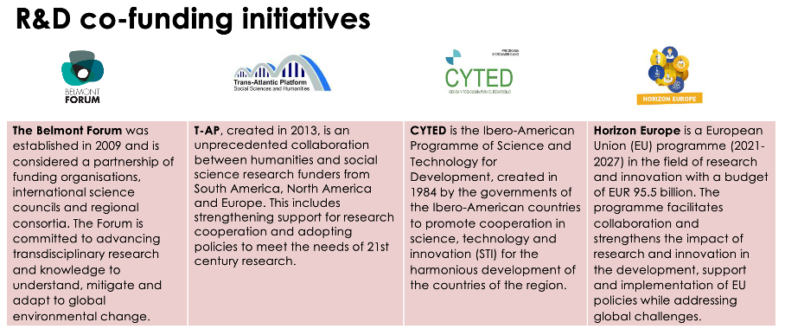The EU considers international cooperation in STI a priority, since it can enable access to cutting edge knowledge as well as to the best talent worldwide. New business opportunities might also present themselves within emerging markets. For example, during the COVID-19 pandemic, STI cooperation was accelerated into action to facilitate vaccine design and production – policymakers would be wise to capitalise on this momentum by increasing their focus on international public-private research cooperation. For these reasons, and plenty more, STI cooperation among agencies and countries is of utmost importance.
In 2022, the Uruguay National Agency for Research and Innovation (ANII) received a grant from the International Development Research Centre (IDRC), a Crown Corporation of the Government of Canada, that enabled it to undertake the project “Supporting Research and Innovation in Latin America and the Caribbean through Enhanced Regional Collaboration”. The overall objective was to improve collaboration among researchers and linkages among Latin American and Caribbean (LAC) Funding Agencies in priority areas for regional development. Technopolis Group was assigned to carry out this project on behalf of ANII. Part of this project was to do the benchmark of the existing initiatives supporting collaboration in STI. The selection of international experiences that could present an opportunity for the LAC region was based on the consultant team’s experience and knowledge, as well as on the initiatives suggested by interviewees. These initiatives are: the Belmont Forum, the Transatlantic Platform for Social Sciences and Humanities (T-AP), CYTED, and the Horizon Europe programme of the European Community. These initiatives, along with their opportunities are highlighted below:

The Belmont Forum was established in 2009 and is considered a partnership of funding organisations, international science councils and regional consortia.[1] The Forum is committed to advancing transdisciplinary research and knowledge to understand, mitigate, and adapt to global environmental change. It offers the opportunity to establish worldwide contacts with a vast arrange of organisations and countries, along with access to a knowledge databank of project results. Funding should be provided by the institutions seeking to collaborate; this means that participation is more accessible to countries that can provide national and/or regional funding or a specific contribution to the research projects.
T-AP, created in 2013, is a first-time collaboration between humanities and social science research funders from South America, North America and Europe.[2] It aims to strengthen support for research cooperation and adopting policies to meet the needs of 21st century research. Calls are opened in areas where there is a growing demand/opportunity for international transatlantic cooperation and/or with the objective of aligning policies and political practices in the respective field. Funding for cooperative projects and partnerships must be provided/identified by national research institutions or other donors; this might limit the participation of countries that do not have their own funds.
CYTED is the Ibero-American Science and Technology for Development Program, created in 1984 by Ibero-American governments, leaded by Spain, to promote cooperation in STI for the synchronised development of the countries of the region.[3] Cooperation is based on joint projects in research, development and innovation among multiple types of stakeholders as well as thematic networks that facilitate cooperation between countries in certain defined thematic areas. Financial resources are quite limited and are accessible only to CYTED countries (as the program is specific to Ibero-American countries) – participation of stakeholders from other countries is also possible, but only at their own expense.
Lastly, Horizon Europe is a European Union (EU) program (2021-2027) in the field of research and innovation.[4] The program facilitates collaboration and strengthens the impact of research and innovation in the development, support and implementation of EU policies while addressing global challenges. The program is also open to researchers and innovators from around the world. Participation in the calls will be possible for the Community of Latin American and Caribbean States (CELAC) only if they have signed association or bilateral agreements with the EU. In other cases, the costs are covered by the country/institution of interest.
The analysis of these programmes has shown that there are already a multitude of opportunities for international cooperation in STI in which LAC countries can participate. Firstly, these programmes are usually open to research institutions, but also to other actors in the research ecosystem, making them less restrictive. Most LAC countries are already eligible to participate and are already participating in calls. Additionally, participation in programmes is possible in almost all fields of international research cooperation and although some programmes prioritise funding along specific thematic lines, this can still serve as an advantage. Finally, the financial instruments, and their size, are quite broad which can fit and help serve many different research goals.
Nonetheless, not all LAC countries can participate equally due to different restrictions placed by the programmes overall or on specific calls. Each programme requires a certain number (usually 2) and type of institutions to join the project. And lastly, funding instruments and their amount are also often limited. At the same time, these programmes are highly fragmented due to the wide coverage of geographic areas and selected thematic fields. Considering the analyses, the following four areas of recommendation were proposed:
- Provide more national or regional funding (schemes) that allow national research institutions and other key players in the research ecosystem to join, (co-)fund and actively participate in the international collaboration programmes mentioned above.
- Seek mechanisms to create collective inter-regional funds especially for large-scale projects that are accessible to members of all types of economies in Latin America.
- Develop funding instruments (programs, initiatives, etc.) that are accessible to individual researchers who join international research cooperation programs, promoting interregional mobility and absorption of research results between countries.
- To ensure the inclusion of countries in thematic areas of strategic interest to the country. In this way, relevant research institutions can join existing networks, projects and programmes taking advantage of the access to global knowledge produced by international partners.
Authors: Juanita García , Anastasiia Konstantynova and Monica Salazar.
Sources:
[2] https://www.transatlanticplatform.com/






